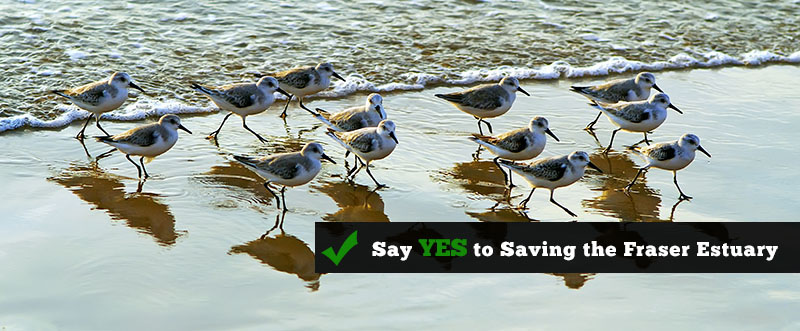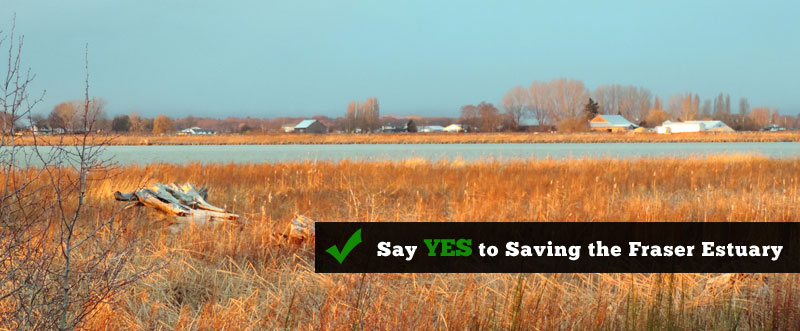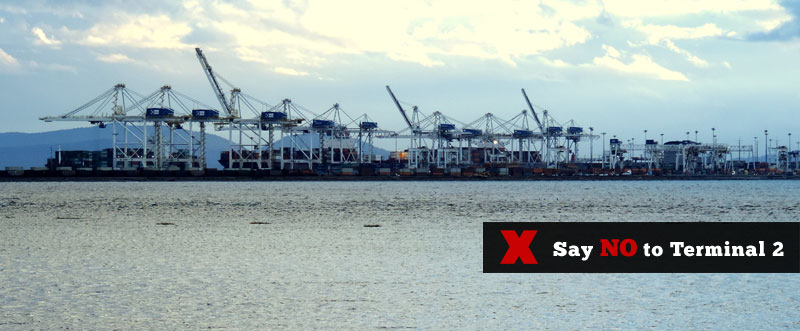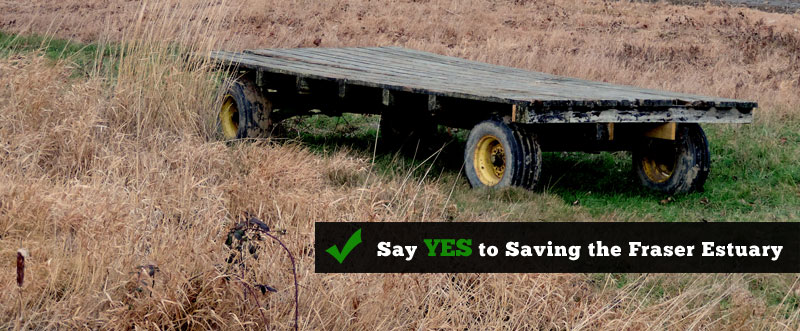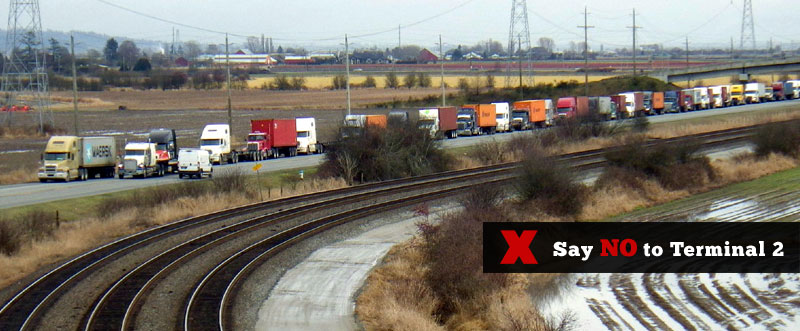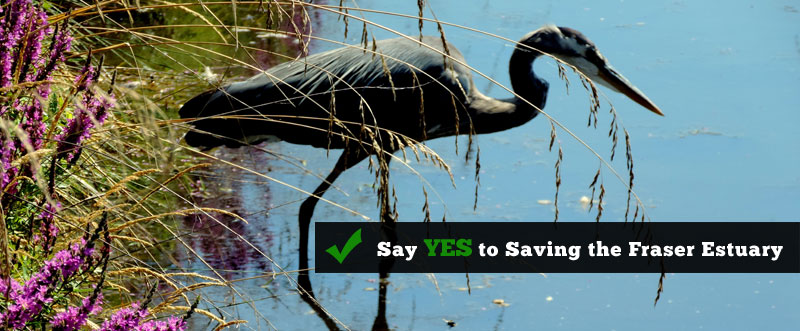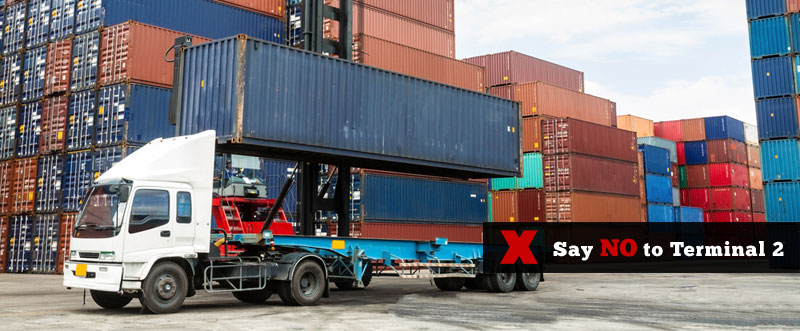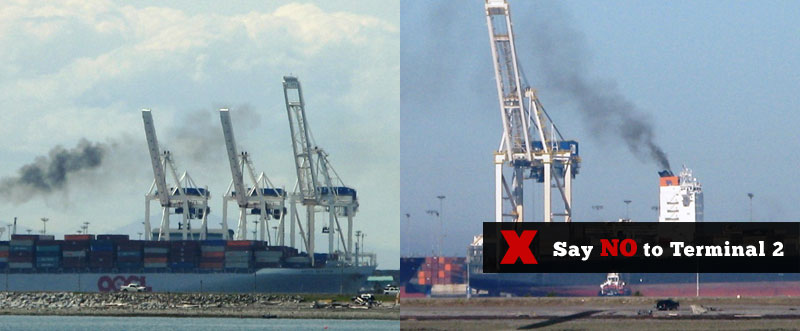Against Port Expansion in the Fraser Estuary BC
APE (Against Port Expansion in the Fraser Estuary BC) is a group of concerned citizens who recognize that plans for container terminal expansion on Roberts Bank (RBT2) will see the loss of globally-significant wetlands and habitat (classified as a Globally Significant Important Bird and Biodiversity Area - IBA/KBA and under threat) for migratory birds, shorebirds, waterfowl, salmon, herring, crabs and orca whales; degradation of the quality of life for thousands of Lower Mainland residents; and the industrialization of prime agricultural land.
View the latest powerpoint presentation
Roberts_Bank_Terminal_2__March_2024.pptx
Building Roberts Bank Terminal 2 in the Fraser Estuary means:
-
Upsetting Roberts Bank’s natural chemistry
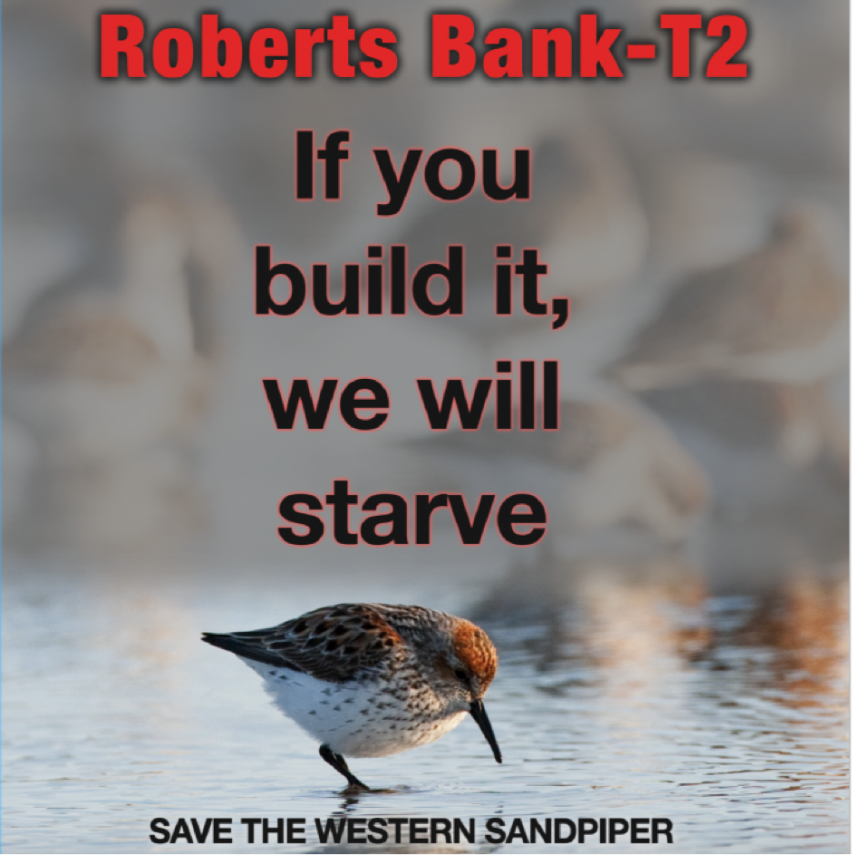
- Destroying the unique quality of its intertidal biofilm
- Breaking the chain of the Pacific Flyway
- Destroying a key refueling stop for migratory birds
- Further declines in the western sandpiper population towards eventual species extinction
- Pushing Orca whales towards their eventual extinction
- Putting juvenile salmon at increased risk
- Further declines in commercial crabbing
- Infringing on First Nations livelihoods and cultural practices
- Increased air, noise and light pollution
- More traffic congestion caused by Port truck traffic
For What? A new $4-6 billion container terminal that can never be economically justified, because there are better cheaper alternatives to satisfy Canada’s trading needs. Demand governments stop this. Email ec.ministre-minister.ec@canada.ca and copy saynotot2@gmail.com
On April 20 2023 the federal cabinet approved RBT2, effectively signing the death certificate for the Fraser Estuary. The BC Government gave its approval on September 28 2023.
Dear Against Port Expansion Community Group Supporters and Members of the Public:
October 13, 2023
Governments Have Betrayed The Environmental Values of the Fraser Estuary
As Executive Director of Against Port Expansion Community Group I write to you, APE Supporters and Members of the Public, after reflecting on the BC Government's approval of Roberts Bank Terminal 2 (RBT2), which effectively ends attempts to stop RBT2 within the federal and provincial legislative framework established to carry out environmental assessments and make decisions. This environmentally disastrous, unnecessary and uneconomic project can still be stopped. Read the letter to find out what you can do to stop the Fraser Estuary from breaching its environmental tipping point.
Read the full letter here:
Governments_Have_Betrayed_The_Environmental_Values_of_the_Fraser_Estuary_APE_Website.pdf
Below is a summary and dateline of the RBT2 project. It was approved:
- Over a mountain of opposition;
- With political interference
- Ignoring Environment Canada scientists’ concerns
- Ignoring significant wide ranging credible research and science, much of it published in peer-reviewed science journals, demonstrating the project’s significant adverse environmental effects that cannot be mitigated.
- Ignoring the facts and evidence.
Major environmental groups, scientists expert in their field, citizen scientists, the Cities of Delta, Richmond and White Rock, MPs, members of the public rose up and voiced their opposition to RBT2. As the final phase of the environmental assessment concluded that opposition grew and grew. The politicians ignored all of that and by approving the project signed the death certificate for what little remains of the natural habitat in the Fraser Estuary and the wildlife that relies on it.
WHEN IT WAS APPROVED THESE WERE THE CABINET MINISTERS KNOWN TO HAVE SUPPORTED RBT2: MESSRS WILKINSON, ALGHABRA, SAJJAN AND CHAMPAGNE
THESE CABINET MINISTERS WERE KNOWN TO OPPOSE RBT2: GUILBEAULT, QUALTROUGH, MURRAY
BUT THEN TRUDEAU SHUFFLED HIS CABINET.
THESE ARE THE MINISTERS STILL IN CABINET. EMAIL EACH OF THEM, ASK THEM TO EXPLAIN WHY THEY IGNORED SCIENCE FACTS AND EVIDENCE AND DEMAND THEY REVIST THEIR APPROVAL
JONATHAN WILKINSON:
minister.ministre@nrcan-rncan.gc.ca
STEVEN GUILBEAULT
ec.ministre-minister.ec@canada.ca;Steven.Guilbeault@parl.gc.ca
CARLA QUALTROUGH:
info@pch.gc.ca; Carla.Qualtrough@parl.gc.ca
FRANCOIS- PHILIPPE CHAMPAGNE: francois-philippe.champagne@parl.gc.ca
TELL THEM TO HONOUR THE AGREEMENTS CANADA HAS SIGNED TO PROTECT THE ENVIRONMENT (MOST RECENTLY AT THE UN BIODIVERSITY CONFERENCE). TELL THEM TO REVERSE THE RBT2 APPROVAL.
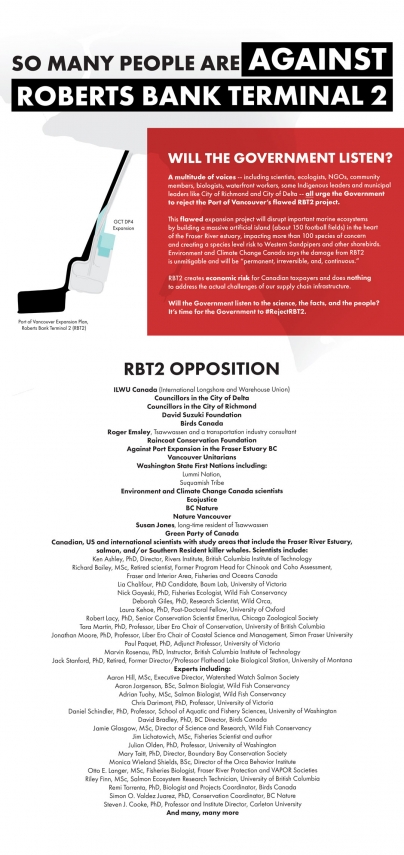
THIS IS THE TORTUOUS PATH THAT LED TO RBT2 APPROVAL
MARCH 2023 STILL NO DECISION - AFTER EIGHT YEARS !!
- MAR. 27 2020 THE FEDERALLY-APPOINTED REVIEW PANEL PUBLISHED ITS REPORT IDENTIFIYING SIGNIFICANT ADVERSE ENVIRONMENTAL EFFECTS IN MANY AREAS SHOULD RBT2 BE BUILT.
- AUG. 24 2020 THE FEDERAL ENVIRONMENT MINISTER PAUSED THE DECiSiON PROCESS AND ASKED THE PORT FOR MORE INFORMATION.
- AUG. 28 2020 THE PORT SAYS IT WILL HAVE COMPLETED GATHERING THE ADDITIONAL INFORMATION PRIOR TO YEAR END
- NOV. 5 2020 THE PORT SAYS IT WILL NOT PROVIDE THE INFORMATION UNTIL SUMMER 2021.
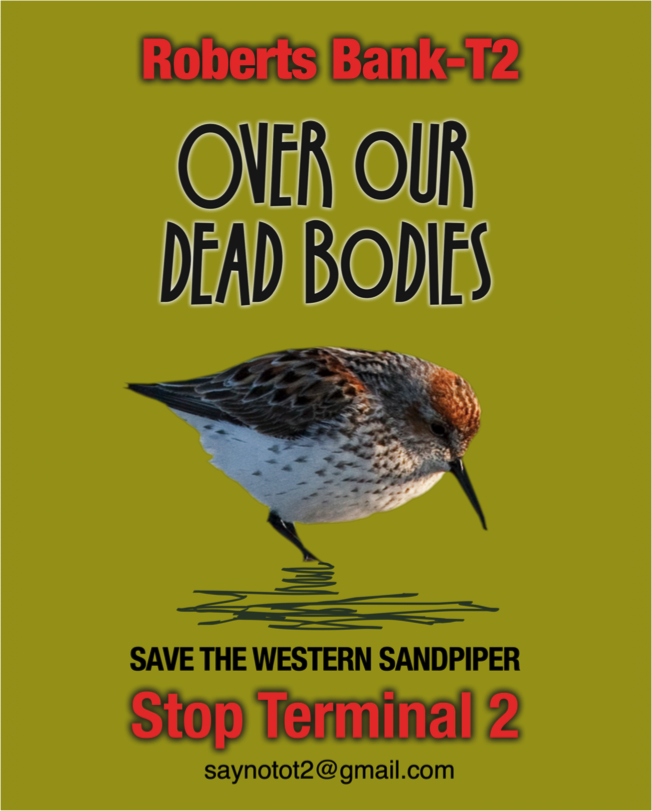
- SEP 24 2021 PORT PROVIDED ITS RESPONSE
- DEC 15 GOVERNMENT PROVIDED A DRAFT OF POTENTIAL CONDITIONS FOR APPROVAL AND OPENED FINAL ROUND OF PUBLIC COMMENT
- MAR 15 2022 PUBLIC COMMENT PERIOD CLOSED WITH THOUSANDS OF OPPOSING SUBMISSIONS
- APR 22 2022 PORT RESPONDED TO SOME OF THE OPPOSING SUBMISSIONS, BUT NOT ON THE KEY ISSUE, BIOFILM
- JUNE 10 2022 PORT RESPONDED ON THE BIOFILM ISSUE. SAME OLD FLAWED SCIENCE, PROMOTING BIOFILM REPLACEMENT WHEN INTERNATIONALLY RECOGNIZED SCIENCE SAYS THIS IS IMPOSSIBLE ON THE SCALE NECESSARY TO REPLACE WHAT WILL BE LOST
- SEPTEMBER 2022 - A WALL OF SILENCE REMAINS OVER OTTAWA ON RBT2
- OCTOBER 26 2022 - ENVIRONMENT CANADA RESPONDS TO THE VFPA WITH A DETAILED ANALYSIS DEMONSTRATING YET AGAIN THAT RBT2 WILL RESULT IN SIGNIFICANT ADVERSE ENVIRONMENTAL EFFECTS THAT CANNOT BE MITIGATED. ECCC SCIENTISTS STATE:
"Given the importance of the Roberts Bank site for the Western Sandpiper, the nutritional requirements for fatty acids of migrating shorebirds, and the predicted effects of the Project on biofilm quantity and quality, ECCC continues to advise that the changes predicted as a result of the Project, as currently designed, would likely constitute an unmitigable species-level risk to Western Sandpipers, and shorebirds more generally". - January 23 2023 Ottawa decides it has all the information it needs to make a decision
- Febuary 2023 - The RBT2 Decision is with the Federal Cabinet acting as Governor in Council
- April 3 2023 Still waiting for a decision from Ottawa. Three cabinent ministers are known to support it. Amazing!!!
- April 20 2023. The federal government approves terminal 2 stating
" I (Environment Minister) have determined that the Designated Project (RBT2) is likely to cause significant adverse environmental effectsreferred to in subsection 5(1) of the Canadian Environmental Assessment Act, 2012.In accordance with paragraph 52(4)(a) of the Canadian Environmental Assessment Act, 2012, the Governor in Council (Federal Cabinet) decided that the significant adverse environmental effects referred to in subsection 5(1) that the Designated Project is likely to cause are justified in the circumstances.
THE FIGHT IS NOT OVER
THE FEDERAL GOVERNMENT IGNORED ITS OWN SCIENTISTS AND THEIR CONCERNS.
WE NEED YOUR HELP. EMAIL THE PRIME MINISTER AND DEMAND HE REVERSE THIS DECISION. pm@pm.gc.ca
The govenrment has the science, facts and evidence. Its own scientists say RBT2 will result in significant adverse environmental effects that cannot be mitigated. How much more does the government need to reject this project?
KEEP THE PRESSURE ON THE FEDERAL GOVERNMENT
TELL THEM YOU WILL NOT ACCEPT RBT2 BEING APPROVED.
WRITE TO MINISTER GUILBEAULT. SELECT COPY & PRINT THIS
Attention Minister Steven Guilbeault:

Roberts Bank Terminal 2 (RBT2) is environmentally unsustainable.
Environment and Climate Change Canada scientists have consistently characterized the negative environmental impacts of the RBT2 project as permanent, irreversible and continuous, disrupting and eliminating quality fatty acid production from diatoms in biofilm across Roberts Bank by dampening and reducing salinity. These particular fatty acids are absolutely required by Western Sandpipers and disrupting their production may also have negative implications for salmon and crab production, as well as eulachon a major part of Indigenous heritage. Many international scientists agree, as do Birds Canada, Western Hemisphere Shorebird Reserve Network, BC Nature, Nature Canada and others.
I am opposed to RBT2 and petition you and Cabinet to reverse your approval for this project.
Date___________________________
Signed________________________Email______________________________
Name_______________________________Postal Code__________________
AND MAIL TO
Minister Steven Guilbeault POST FREE
House of Commons
Ottawa, Ontario, K1A0A6
See what others are doing to stop RBT2:
1. Fraser Delta in the International spotlight. Birdlife Interantional has joined the fight to stop RBT2.
https://www.birdlife.org/worldwide/news/waterfowl-winter-refuge-fraser-river-delta-risks-being-lost-forever?utm_source=BirdLife+International+News+Notifications&utm_campaign=a1bb67f58b-Summary_news_notification&utm_medium=email&utm_term=0_4122f13b8a-a1bb67f58b-131704081&mc_cid=a1bb67f58b&mc_eid=0757e28fcf
2. In May 2022 The Garden City Conservation Society published a comprehenisive analysis of all that is wrong with the RBT2 project, under the title Stop RBT2 - To Enable Success, and sent it to the federal Environment Minister and the Cabinet
stoprbt2_enablesuccess_gccs_0.pdf
3. A video by Ranincoast Conservation
https://youtu.be/HkKLY3P2_ys
4. Natural Legacies versus Waste
5. Fraser Voices
6. Georgia Strait Alliance
https://georgiastrait.org/work/species-at-risk/proposed-terminal-2-deltaport-expansion-2/
NO to RBT2 Federal Funding
Should the Carney government have any inclination to fund the Roberts Bank Terminal 2 project, either from the Infrastructure funding in the Nov. 4 budget or through one of the federal agencies or bodies that funds projects, it must understand one fundamental. RBT2 is not economically viable. The federal government must never agree to fund any portion of it.
It is not a “nation building” project, it should never have weaselled its way onto the major projects list. It has been mired in controversy for years and condemned on environmental grounds by major national and international entities concerned about environmental damage and the potential for wildlife species declines towards extinction. Over and above that it is an economically unviable project and a huge pit into which to pour funds, without any prospect of ever getting a reasonable return on investment.
Consider these facts:
- The Vancouver Fraser Port Authority (VFPA) has never updated its years old project cost estimate of $3.5 billion. Given the increases in labour and material costs, engineering estimates now suggest it will take another $ 5 billion or more. That is today’s dollars. Construction will not start for another three years at least. By that time RBT2 will likely cost in excess of $10 billion, making it the most expensive Greenfield container terminal ever built and with the highest cost per container to operate.
- VFPA container volumes are stagnant. This is not a healthy expanding operation. The information on its website is incorrect. It handled 3.4 million containers (TEUs) in 2024, the same as it handled four years earlier in 2020. VFPA has consistently under performed against its container forecasts. It fudges its performance metrics in its press releases and on its website: “Strong historical container trade growth at the Port of Vancouver with a compound annual growth rate of 4% between 2000 to 2024” says the Port’s website. Total annual container volumes (TEUs) from its own website - 2020 3,467,521; 2021 3,678,952; 2022 3,557,294; 2023 3,126,599; 2024 3,473,822. That is most certainly not a 4% CAGR. Its actual compound annual growth rate is less that 3 percent measured over the last fifteen years. The 4 year actual CAGR 2020 to 2024 is 0.5% The numbers show its volumes in 2024 were up only slightly compared to 2020. It handled a measly 2 percent more containers in 2024 than it did in 2019 and 2018 - six years ago.
- Close to 50 percent of containers it handles are empty. It handled fewer laden containers - i.e. actual goods inside - in 2024 than it did all the way back to 2017
- It has one of the worst port performance records for container terminals. VFPA container terminals rank at 347 out of 348 ports in terms of efficiency. This is not a well run efficient operation worth investing $10 billion or more of government funds.
- There is plenty of spare container terminal capacity on the West Coast - in excess of 2 million TEUs. Canada’s trading needs are well covered and more container capacity will not be needed for years to come. When more is needed Roberts Bank is the worst place to add it. The environment cannot handle it; shipping lanes are already congested; the Fraser Canyon cannot handle additional container trains; lower mainland highways are congested with port truck traffic; RBT2 adds even more vessel traffic to Juan de Fuca Strait and the Salish Sea, already over burdened with new Trans Mountain and LNG vessel traffic.
- Government scientists have repeatedly stated that building RBT2 will cause significant adverse environmental effects to the Roberts Bank ecosystem that will be immediate, continuous, permanent, irreversible and unable to be mitigated. These adverse effects will cause harm to southern resident killer whales, migratory and other shorebirds, fish and fish habitat, crab populations, and may lead to species extinction.
- In a July 12, 2023, open letter based on UBCIC Resolution 2023-37, the Union of British Columbia Indian Chiefs (UBCIC) expressed strong opposition to the Roberts Bank Terminal 2 (RBT2) project, citing insufficient consultation, irreversible environmental damage, unaddressed cumulative effects, and violations of Indigenous Title and Rights. The letter urged federal and provincial governments to immediately pause development. There are other court cases trying to stop RBT2.
- VFPA continues to ignore the science, claiming that the negative environmental effects will be benign and habitat can be replaced, without any proof to support this contention and in direct conflict with scientists' findings based on proven research published in peer reviewed journals.
Canadian taxpayers do not want to pay for another Mirabel. Why would Canadian taxpayers be on the hook to pay for some or all of the Roberts Bank Terminal 2 project costs, when other companies are prepared to fund container terminal expansions at much lower build costs without government funding? Even setting aside the “significant adverse environmental effects” that the Governor in Council recognized back in 2023, the return on investment is not there. This project is not viable economically so why would Canadians want to fund it?
- Do not fund RBT2 from monies allocated in the November 4 budget,
- Do not fund all or any part of its development costs
- Do not give it priority in the second tranche of major, "nation-building" projects to be fast tracked.
Rather do what the federal government should have done already - tell the Vancouver Fraser Port Authority to stop RBT2 and instead collaborate with existing container terminal operators to plan and expand container terminal capacity when Canada’s trading needs require it and to do so with minimal negative environmental effects.

RBT2 - In Nobody's Best Interest
Roberts Bank Terminal 2 is in nobody's best interest.
Who would be crazy enough to respond to the Vancouver Fraser Port Authority's request for qualifications to build a huge man made island on Roberts Bank - one of Western North America's most important ecosystems?
https://www.infrastructurebc.com/project/roberts-bank-terminal-2-landmass-and-wharf-project/
Do these companies not realize that Roberts Bank Terminal 2 is neither an environmentally nor economically sound proposition. This is not a project that the Canadian government will want to wear when it becomes an environmental and economic disaster and an international embarrassment to Canada.Canada does not need another Mirabel
Do those companies not realize that they will be contribuiting to the environmental degradation of a BC Wildlife Management area that "... provides critical wintering grounds for the highest number of waterfowl and shorebirds found anywhere in Canada, including at times up to eight per cent of the entire North American population of Dunlins, four per cent of its Trumpeter Swans, and three per cent of its Black Bellied Plovers. American Wigeon, Northern Pintail, Mallards, Green-winged Teal, Wrangel Island Snow Geese, and Black Brant can often be seen in the thousands. In addition to shorebirds and waterfowl, Great Blue Herons, Barn Owls, Short-eared Owls, Virginia Rails, American Bitterns, Soras, Northern Harriers, Bald Eagles, Red Tailed Hawks and Peregrine Falcons are found here".
Do those companies not know that they will come under scrutiny by numerous Canadian and International environmental groups?
Do they not realize that building this project is in no ones best interest?
Here is why:
1. Not in Canada’s trading best interest.
Vancouver does not need another container terminal. It currently has four container terminals, two in the inner harbour, one on Roberts Bank in the Fraser River Estuary and one up river in Surrey. In 2024 the VFPA handled 3.47 million containers TEUs - Twenty foot equivalent units). VFPA container shipment volumes are stagnating. Volumes in 2024 are about the same as 2019, having increased by a measly 2 percent in five years.
Several of these container terminals have significant spare capacity. Port operators indicate that Vancouver has in the order of 2 million spare container capacity. Yet Vancouver is plagued by delays. 75 percent or more of Vancouver’s volumes come from or go to Midwest and eastern Canada and US markets. Vancouver handles a significant number of US containers - which adds nothing to Canada’s economy. Container import volumes headed to eastern markets and exports from those markets travel by rail through the Fraser Canyon. That rail route is heavily congested with difficult gradients through the Rockies. Adding additional container volumes from Roberts Bank Terminal 2 will make the congestion even worse.
2. Not in the Salish Sea’s best interest
The Juan de Fuca Strait and the Georgia Strait are very congested waterways. And they are going to get more so with LNG from Tilbury and elsewhere, Trans Mountain pipeline, vessel traffic as well as more cruise ship traffic. Juan de Fuca also serves vessel traffic to and from US terminals and this traffic is growing as well. Adding more ships to and from RBT2 will make the Salish Sea even more congested and more dangerous. There have been recent accidents - recall the MV Kingston for example.
3. Not in the Southern Resident Killer Whales best interest
The three SRKW pods are an endangered species at serious risk. The Haro Strait is their prime feeding ground and yet it is also a major route for vessel traffic. Vessel noise negatively impacts their communication and feeding. Vessel strikes are always a possibility with container vessels traveling at 11 knots.
4. Not in the Roberts Bank ecosystem’s best interest
Roberts Bank is a very important ecosystem for a myriad of species. The Roberts Bank biofilm is unique in its quality, quantity and physical presence. The Roberts Bank Wildlife Management area is recognized as “providing critical wintering grounds for the highest number of waterfowl and shorebirds found anywhere in Canada"
Building RBT2 threatens these waterfowl and shorebirds and none more so than the biofilm that is critical to the survival of the Western Sandpiper population, Canadian Federal Government scientists have said repeatedly that building RBT2 will result in “significant adverse environmental effects which will be immediate, permanent, irreversible, continuous and cannot be mitigated”
5. Not in Delta’s nor the Lower Mainland’s best interest
Port semi trailer traffic, both those empty as well as loaded with containers, are a plague for the areas highways. Highway 17 and 99, in particular, are heavily congested with port semi trailers running to and from the existing Deltaport container terminal. Adding RBT2 will result in even more noise and air pollution from this truck traffic as well as causing even more traffic congestion.
6. Not in the current four berth Deltaport Container Terminal’s best interest.
The Deltaport operator has said that adding RBT2 with its separate inter-model rail yard will reduce the productivity of the existing Deltaport. Vancouver is already known as a laggard for its poor productivity. RBT2 will make it even worse.
7. Not in the best interest for Industrial Land
There are numerous mountains of stored containers all over Vancouver and the Lower Mainland. These stored containers remove valuable industrial land from the already scarce supply. RBT2 will add to that problem.
8. Not in Canada’s economic best interest
RBT2 is now estimated to cost $10 billion or more to build. It was already recognized as the most expensive Greenfield port development anywhere in the world. Where is that $10 billion going to come from? Certainly not from federal government coffers. Why would the federal government, already debt ridden, sanction this kind of uneconomic development when there are other more viable and less environmentally destructive alternatives?
A message to Prime Minister Carney and the Canadian Government:
Since RBT2 is in no-ones best interest why is your government continuing to support it? Who - which interested parties - are lobbying for RBT2 to be built?
Prime Minister Carney - you must know that there is no need for more west coast container terminal capacity for years to come. And you must also know that when more is required it can be developed in Prince Rupert, where there is a port operator ready to expand that terminal and has the space to do so at less than half the cost. Prince Rupert offers a terminal that is two sailing days closer to Asia, an entry into port that has none of the congestion or risks of the Juan de Fuca and Georgia Strait and a rail route to the East that is not congested, has better grades then the southern rail route over the Rockies and is faster for container shipments to the East and from the East back to Prince Rupert.
The logical, the only realistic option that is best for Canada’s trading needs, most economic and most environmentally responsible is to expand container terminals capacity in Prince Rupert.

Canadian Governments and Laws Fail to Protect the Fraser River Estuary
The Boundary Bay Conservation Committee recently prepared and published a paper on Roberts Bank Terminal 2. Read it here:
Canada_failing_to_protect_Fraser_River_Estuary.pdf
As the paper suggests The Canadian Government is ignoring scientific evidence from government and independent experts. The Governments of Canada and British Columbia approved RBT2 based, not on science, but on “justification” for the public good. There is neither economic nor environmental justification.
As a result No one is protecting this globally-important, unique estuary.
Environmental groups challenged the approval in court. In January, 2025, the Federal Court ruled in support of the approval stating government agencies will ensure protection through the process of conditions and permits. These agencies do not have the funding, time, legal authority, or expertise to ensure the protection of the interactive, interdependent processes that create unique, healthy estuarine ecosystems. Such expertise doesn’t exist. Follow-up investigations of projects show that government agencies provide patchwork, rubber-stamp approvals with negligible enforcement.
Furthermore there is no business case for building an island for containers in the Fraser estuary.
With the current and projected volume increases for West Coast container traffic current container terminal capacities in Vancouver and Prince Rupert are sufficient for Canada's trade requirements for many years to come. And when more capacity is required Prince Rupert has the space and capacity to add as many as 5 million TEUs, at half the cost without the environmental degradation that RBT2 will deliver.
The stated cost of RBT2 at $3.5 billion was unrealistic five years ago; an updated and more realistic cost is likely in excess of $6 billion, making it simply not economically feasible. How ironic that public assets and tax dollars will be required to support this uneconomic Project that is not needed and that will cause irreparable damage in the globally-significant Fraser River Estuary.
The Vancouver Fraser Port Authority still needs a Fisheries Act Authorization to proceed. They must not get it. Wildlife species including Western Sandpipers, Salmon stocks and Southern Resident Killer Whales will not survive and will go extinct if RBT2 is built.
Tell the Department of Fisheries not to approve Roberts Bank Terminal 2, because doing so violates the Species At Risk Legislation and will result in wildlife population declines to the point of potential species extinction.
Write to DFO.Minister-Ministre.MPO@dfo-mpo.gc.ca

RBT2 Federal Government Hypocrisy
RBT2 Federal Government Hypocrisy
Canada is losing its way on its environmental agenda. “Justified in the circumstances” is how the federal government approved Roberts Bank Terminal 2.
Is it Justifiable to put wildlife species already in decline on the path to extinction?
Is it justifiable to approve a container terminal that can be built for half the cost elsewhere with little environmental degradation?
Is it justifiable to approve a container terminal that the federal government’s own scientists told them would result in
negative environmental effects that would be immediate, permanent, irreversible, continuous and cannot be mitigated?
These are the questions that the federal government has never answered. That is irresponsible government.
Isabelle Groc a writer, conservation photographer, documentary filmmaker, book author, and speaker based in Vancouver, Canada,
is making a documentary about Roberts Bank Terminal 2. Below is a recent Facebook post of hers that talks to the environmental disaster
that is Roberts Bank Terminal 2.
As the post indicates Isabel is making a documentary and I encourage everyone to find out more by visiting the website.
Get involved.
As Margaret Mead said many years ago:
"Never doubt that a small group of thoughtful committed individuals can change the world. In fact, it's the only thing that ever has."
This is Isabel's post:
"Last week, I have learned that the federal Court has ruled against environmental groups that filed a legal challenge
against the Roberts Bank Terminal 2 Project in the Metro Vancouver region of British Columbia.
The Port of Vancouver’s plan to build a second container ship terminal will destroy 177 hectares of the last intact estuarine habitat in western Canada.
Over 100 species at risk depend on this habitat for survival, including the endangered southern resident killer whales and their food source,
Chinook salmon. Environmental groups argued the federal government breached the Canadian Species At Risk Act
by allowing the destruction of this habitat, a challenge they have now just lost.
We must not give up.
One of the species that will be critically impacted by this project are western sandpipers. They may not be as charismatic as
southern resident killer whales and are often unjustly overlooked in this battle against the megaport.
Yet we must not underestimate the power of these tiny shorebirds that weigh no more than 35 grams and their potential to stop
the Roberts Bank Terminal 2 Port Expansion Project.
We are making a documentary to raise awareness about the importance of Roberts Banks and intertidal mudflats
for the survival of western sandpipers. The birds and what they eat in the mudflats provide a critical opportunity to stop this project:
we can protect the western sandpipers, but also all the species at risk that depend on this habitat, including southern resident killer whales
and pacific salmon.
To learn more about what you can do now and how you can help, read my latest blog on my website:
https://www.isabellegroc.com/saving-western-sandpipers.../
And visit the film website:
Thank you for your support!



